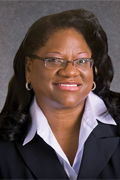TD Magazine Article
Stay True to You
The definition of career success is up to you.
Sat Oct 01 2011

The definition of career success is up to you.
Norma Clayton
Prior to her position at The Boeing Company, Norma Clayton held leadership roles at McDonnell Douglas, Lockheed Martin, General Electric, RCA, and General Motors. She currently participates in a variety of community, church, and civic activities; is a Boeing executive focal for Michigan State University; and is a member of Leadership America.
Q| What steps did you take to rise in your career?
A| During my senior year of college, I built a career roadmap to define my long-term personal and professional goals. This map has been a guide throughout my career and has shaped the decisions I've made along the way. I revisit it every year to see what Ive accomplished, what changes need to be made, and what actions I need to take to address those changes.
Q| What lessons did you learn along the way?
Run your own race. Take time to get to know who you are and what you value. Make sure the decisions you make are guided by your passions and identity.
Create your own definition of success. People invent false ideas of what success looks like. If you want the corner office, go for it. If you want something else, you have to define it or you will never be satisfied.
Pick your bosses wisely. Select a manager who is supportive of your ideas and goals. This can be difficult, and it may ultimately involve the decision to leave a company.
Stay in an assignment long enough to learn from your mistakes. You will learn the most from how you recover from those mistakes.
Know when it is time to move on. Whether this means changing positions, companies, or even career paths, you have to know when to go. Otherwise, you will get stuck and deny yourself new opportunities and challenges.
Q| What strengths have you relied on for career development?
A| Self-confidence is one of my greatest strengths—I'm a risk-taker and not afraid to try something new. I adapt easily to different environments and new situations. I'm also a strategist and tend to see the big picture, evaluate the situation, and make decisions based on these perceptions.
Q| Did you have a coach or mentor who was influential in your career journey?
A| I've had several mentors throughout my career. I believe you need more than one, because as you rise in an organization, you need guidance at each level. When choosing my mentors, I looked for people who were doing extraordinary things in the areas I wanted to grow. I also aligned myself with people who had similar interests and values as I.
What I remember most about my mentoring relationships is the candid feedback I received. It wasn't always what I wanted to hear, but it was what I needed to hear to make good decisions. For example, one of my mentors taught me that sometimes a step back will take you forward. In this instance, I thought I was ready for a career change, but I had a skill gap that needed to be addressed first.
Q| What are you most excited about in the learning and development profession today?
A| We are moving away from traditional learning methods and into collaborative learning, which is learning by doing and sharing information with others. We're adapting technology to create learning solutions that support collaborative learning.
Q| What advice would you give a learning and development professional about how to climb to the executive level?
A| Work on foundational skills and gain an understanding of the business and its values. It's important to learn your craft and seek a variety of experiences across HR and business functions. Its also vital to remain in a continuous learning environment so you can keep up with all of the changes in the field. Finally, understanding what a company values will help you to make important decisions about how much time you spend there and what you can accomplish.
